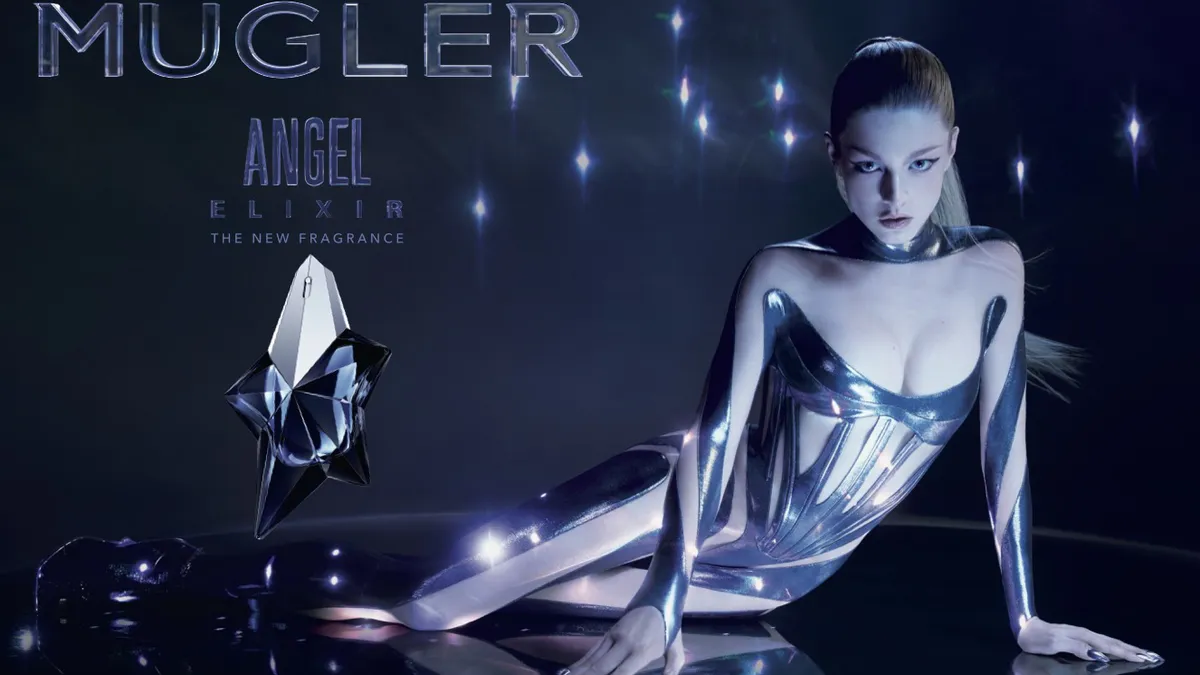Campaign Trail is our analysis of some of the best new creative efforts from the marketing world. View past columns in the archives here.
In 1992, Thierry Mugler upended the fragrance world with the launch of Angel, the first gourmand perfume and one of the best-selling fragrances of all time. More than three decades later, Angel is at the center of one of the luxury brand's most significant moves since its acquisition by L’Oréal in 2019.
Mugler and creative director Casey Cadwallader tapped Publicis Luxe to craft a campaign to launch the new fragrance Angel Elixir. At the center of the effort is a 60-second short film starring Hunter Schafer that envisions the fragrance as a shooting star that transmogrifies the model-actor-activist into her highest form. The media campaign launched worldwide on March 1.
When planning the campaign, Publicis Luxe and Mugler's marketing team quickly synchronized around a story of a woman moving towards a shooting star — inspired by Angel's iconic bottle shape — and emerging from the collision reborn as a new woman who is more confident and more striking. The pitch would allow Mugler to marry the new fragrance with the brand's eye-catching fashion.
"We really wanted to match the two universes and to have consistency between all that is done on fashion and the fragrance part of the brand," explained Publicis Luxe creative director Aurélien Nauleau. "We involved Casey quite [quickly] on the project and we had a lot of calls from that starting point to twist the script and story to make it a little bit more surprising at each part of the movie."
At the heart of the Angel Elixir campaign was the idea of transcendence and transformation into a new vision of femininity that is contemporary, liberated and boundless. To bring this concept to life, the team casted Schafer, who has modeled for numerous fashion houses and broke through in pop culture due to her starring role in HBO's controversy-courting high school drama "Euphoria." To bring the film from script and casting to filming and final product, the creative team held a competition between three directors, with Quentin Deronzier — a French director whose credits include music video work for Drake — winning the day.
"Quentin was really the one that understood the most about the brand and where we wanted to push it visually. He brings a lot to how to make the story possible, how to create it and how to be visually a little bit more surprising," Nauleau said.
"Angel Elixir - the Film" is a striking, futuristic short film that is in constant, almost vertigo-inducing motion. Schafer's character begins by walking on a long, white catwalk in black space meant to evoke Mugler's fashion shows. Soon, she is running on what is revealed to be a vertical building amid skyscrapers in the night sky. The perspective changes again, as a zoom into Schafer's iris morphs into the curvature of the Earth. The character lets go and floats toward a shooting star, initiating a process that transforms her into a crystal-adorned celestial body. Instead of closing on a standard packshot, Schafer's character catches the Angel Elixir bottle and flings it back to the camera and into space.
The film was a collaboration between stakeholders. Cadwallader designed the 3D-rendered dress that Schafer's final form wears based on a drawing from the archives of Mugler founder, Thierry Mugler, while 3D artists worked to fine-tune the render, including the stardust that fills the frame. For his part, Deronzier came up with the idea and created the animatic for the eye-to-Earth shot, and used a 360-degree camera to capture Schafer for the render. The film is soundtracked by a remix of Charli XCX's "Dreamer" by Ashland Mines, two frequent Mugler collaborators.
"From the starting point with Casey, the aim that we had was we don't want to make a classical perfume commercial movie — we want to have something really out of the box, to shake up the category a little bit," Nauleau said.
The short film touches on three values that are part of Mugler's DNA: fantasy, fascination and fearlessness. Mugler plays in the fantasy world of high fashion — it is not a casual or lifestyle brand. The sci-fi surreality of the film speaks to the brand's embrace of the unreal and poetic, while Schafer's fierce performance keys into the brand's fearless ethic.
The inclusion of Schafer, who is transgender, also continues Mugler's long tradition of incorporating LGBTQ people and culture into its shows, films and campaigns. Schafer first made headlines in 2016 as a plaintiff in the ACLU's lawsuit against North Carolina's so-called "bathroom bill." Even at a time when the inclusion of trans and gender non-conforming people is causing conservative backlash against companies including Bud Light and Nike, Schafer's casting was a no-brainer for the unapologetic Mugler brand.
"We really wanted somebody relevant to all of [Mugler's] values around inclusivity and diversity," Nauleau said. "Hunter was, for us, the perfect woman to embody all that."















